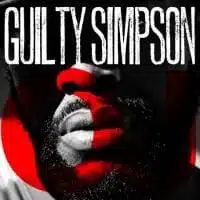
Nearly sunk by a series of sound collages driven by film dialogue or classic comedy albums, the OJ Simpson collaboration between gruff Detroit-born Guilty Simpson and Madlib is short on the concrete tracks that initial news of the pairup promised. A mere 12 of the album’s 24 tracks feature the MC, a mystifying stat when you consider it billed as a Guilty Simpson release. I’m hardly one to quibble about a forum for dollar-bin visionary Madlib to stretch his wings and empty his crates, but on OJ Simpson, a wealth of innocuous interludes works only to soften Guilty’s direct approach.
An artist who’s built a veteran reputation for murdering guest verses on other people’s records (Jaylib, Popular Demand, Two/Three), Byron “Guilty” Simpson’s full-length debut finally came to fruition in 2008. Ode to the Ghetto offered a fittingly harsh sketch of a region that suffered nearly 20,000 violent crimes in the previous year. Ode‘s host of producers, such as Madlib (who remixed this record as part of 2010’s Madlib Medicine Show series), D12’s Denaun Porter, and J Dilla, contributed both grim and minimal backdrops to suit Guilty’s bleak characterizations of his neighborhood.
The stories are hard and sometimes humorous (though not void of crass sexism typical of the genre), with varied and memorable beats. Most importantly, it’s Guilty at the center, rolling out a streamlined theme: Detroit is where I’m from, I’ve worked hard to get here, and this is how I feel. Standout OJ Simpson tracks offer similarly focused rhymes, but the weighty dose of segue material, often sans Madlib’s adept beat machine command, establishes little more than a disconnect in most occurrences.
The pre-album 12″ track “Coroner’s Music” is definitely one of the strongest OJ Simpson tunes. While I agree with PopMatters‘ Ron Hart about the hits of Madlib’s hyperactive 2010 catalog, I respectfully differ with his characterization of Guilty Simpson as an “average” MC, and cite this heater as Exhibit A.
Guilty’s flow has never exactly been easy to swallow, but the punchlines are rampant on “Coroner’s Music”, the visuals are vicious, and the threats are first class. Void of choruses, Guilty rides Madlib’s tumbling drums for a straight two minutes, sounding not unlike he did a few years ago on Chrome Children‘s “Clap Your Hands”, suggesting that he “does in” opponents “like tube steak”. This is child’s play compared to “Outside”, where alongside the Strong Arm Steady crew, Guilty speeds up his usually relaxed cadence to “turn your little house party into UFC”. Minimal instrumentation is ideal for the mood. The Beat Konducta cobbles film soundtrack screams, glass-breaking sounds, and horror flick piano for “Outside”. The arrangement is like the perfect OJ Simpson storm, a mesh of leftfield MPC alchemy and hard-cracking verses.
“Hood Sentence” is built on a more prominent groove with walloping bass, organs, and pattering hand drums, but a spread of jarring TV show one-offs from Madlib’s sampler flicker in and out at random. It gels, especially because it follows “Gone Crazy Interlude”, one of the few instrumentals that matches the record’s overall grumbly mood. Well, mostly grumbly – it isn’t all piss and vinegar. The slow cooker “Cali Hills” is Guilty’s tribute to the late studio workhorse/hip-hop luminary J Dilla, a dear friend who gave the rapper his first official feature track. Guilty’s eulogy traces their relationship back to its early days through when the producer had taken ill.
As Guilty explained to me in a 2007 interview, Jay “was still more concerned with [him] being comfortable and having the things that [the MC] needed, rather than him being sick.” On “Stress”, a mellow cut initially meant for an unfinished Dilla/Guilty LP but finally issued as a single in 2009, Guilty mulls the tedious responsibilities that materialize too often in the face of a slim bank account. He sounds as comfortable here as he does detailing the smackdown, and it speaks to the versatility that escapes his critics, probably because Guilty is more often delivering the latter.
On Strong Arm Steady’s In Search of Stoney Jackson, Guilty rattled off his trademark message for rivals, suggesting that he’d “separate the grizzlies from the Teddy Ruxpins” over a crusty funk-powered, atypically “clean” beat from Madlib. His rant is ever-rooted in smearing competition, but Guilty’s snappy wordplay has him teetering on the edge of physically putting someone through a window instead of actually following up on the promise, which is he where likes it to be. The filler on OJ Simpson robs him of the tense atmosphere that he pulls together on the vocal cuts. Just as Madlib’s meandering interludes seem bound to Madvillainy‘s core (where there are more vocal outings than not), for example, all of the unrelated spoken word bits and beatless sketches that filter between Guilty’s honed performances on OJ Simpson temper the MC’s limitless bragging reserves, or at least obscure them somewhat. Nobody wants that, especially the guy who’s worked so hard to get his name on the front of an album,rather than between parentheses in the liner notes.
